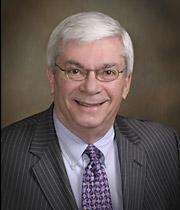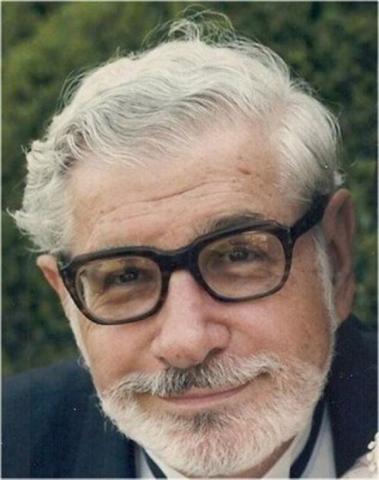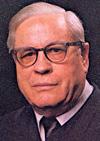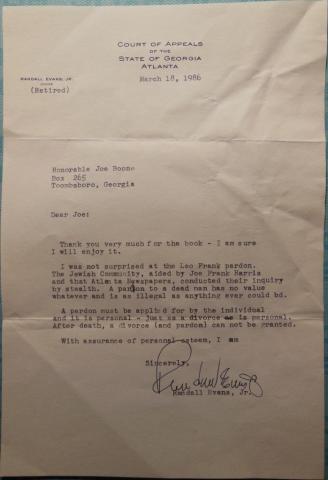Georgia Judge says Leo Frank posthumous pardon is not legal
The letter written by retired judge Randall Evans Jr. is currently on sale at Ebay. Enlarge
By Carolyn Yeager
On May 15, 1983, retired Georgia Appeals Court Judge Randall Evans Jr. published a statement on the Leo Frank case in The Augusta Chronicle-Herald in which he claimed that the proposed posthumous pardon of Frank was "completely ridiculous" because a dead man can't be pardoned.*
[*the actual article from the Chronicle-Herald cannot now be accessed, but it was commented on and quoted from at the time.]
Evans also said that the evidence of Frank's guilt "was overwhelming" and described the commutation of Frank's sentence as "the rape of the judicial process" by Govenor Slaton.
* * *
Seven months earlier in October, 1982, the State Board of Pardons and Paroles had received a formal application for a posthumous pardon for Leo Frank. The application was filed by the Anti-Defamation League, the American Jewish Committee, and the Atlanta Jewish Federation, and directed by a Lawyer's Committee chaired by Atlanta immigration lawyer Dale M.Schwartz.
 “I am not working for Leo Frank or his family," Dale Schwartz (pictured right) stated publicly. The core of seeking a pardon for Leo Frank, he said, was an attempt to obtain an official repudiation of anti-Semitism and bigotry and to "remove a blot on Georgia history." As such, the petitioners based their case for pardon not on the legality of the trial and conviction of Leo Frank, but on extra-legal concerns.
“I am not working for Leo Frank or his family," Dale Schwartz (pictured right) stated publicly. The core of seeking a pardon for Leo Frank, he said, was an attempt to obtain an official repudiation of anti-Semitism and bigotry and to "remove a blot on Georgia history." As such, the petitioners based their case for pardon not on the legality of the trial and conviction of Leo Frank, but on extra-legal concerns.
Dale Schwartz is the type of Jew who would and did tell the editor of Israel Today in a 1984 interview,
"It was determined that Georgia would perhaps recognize the type of posthumous pardon which did not merely grant 'forgiveness' for a crime committed in the past, but rather would ask the defendant to forgive the state for having wrongfully convicted him."
One of the lawyers working with Schwartz was Charles Wittenstein (pictured right), who was on the staff of the American Jewish Committee, and later the Anti-Defamation League for 20 years (1974-94), in Atlanta.
 Said Bill Nigut, the ADL's southeast regional director:
Said Bill Nigut, the ADL's southeast regional director:
“There are a number of civil rights issues that he worked on that we point to with a lot of pride and that the entire national organization looks at as being significant achievements. One of them is that Charles was one of the ADL staffers who worked to obtain a posthumous pardon for Leo Frank."
“The fact that Charles was the key to getting the pardon is something that means a great deal to the Anti-Defamation League.”
The Anti-Defamation League's National Director from1979 to 1987 Nathan Perlmutter wrote on the subject: "From a broad point of view, the Frank pardon is of no consequence. An innocent Jew was lynched by a mob inflamed by anti-Semitism. It has never happened before or since in the United States."
They keep pushing the false assumption that Frank was innocent, when all appeals to retry him were found without merit, all the way up to the Georgia, and even U.S., Supreme Courts.
* * *

On March 18, 1986, about a week after the qualified pardon was issued, the following letter was written by former Judge Randall Evans Jr. (pictured left) to Joe Boone of Toomsboro, Georgia (see facsimile above):
Honorable Joe Boone
Toomsboro, GeorgiaI was not surprised at the Leo Frank pardon. The Jewish community, aided by Joe Frank Harris and that [sic] Atlanta newspapers, conducted their inquiry by stealth. A pardon to a dead man has no value whatever and is as illegal as anything ever could bd [sic].
A pardon must be applied for by the individual and it is personal – just as a divorce is personal. After death, a divorce (and pardon) cannot be granted.
Signed Randall Evans Jr.
Can a dead man be pardoned?
It doesn't seem to be spelled out clearly in the law, However, it appears to be understood in the negative. I found an item on pardons on a webpage about sermons. This sermon-idea included these relevant words:
An item in the May 2, 1985, Kansas City Times reminds us of a story you may be able to use in an evangelistic message. The item had to do with the attempt by some fans of O. Henry, the short-story writer, to get a pardon for their hero, who was convicted in 1898 of embezzling $784.08 from the bank where he was employed. But you cannot give a pardon to a dead man. A pardon can only be given to someone who can accept it.
Back in 1830 George Wilson was convicted of robbing the U.S. Mail and was sentenced to be hanged. President Andrew Jackson issued a pardon for Wilson, but he refused to accept it. The matter went to Chief Justice [John] Marshall, who concluded that Wilson would have to be executed. "A pardon is a slip of paper," wrote Marshall, "the value of which is determined by the acceptance of the person to be pardoned. If it is refused, it is no pardon. George Wilson must be hanged."
The clear meaning here from the Chief Justice of the U.S. Supreme Court is that the person to be pardoned must first request a pardon, and then personally accept it. This follows that a pardon cannot be given to a dead man who not only has not personally asked for it, but who cannot accept or decline it.
For we must remember, it is generally assumed that acceptance of a pardon is an implicit acknowledgment of guilt, for one cannot be pardoned unless one has committed an offense. That is the reason a pardon might be rejected.
* * *
In 1943, Georgia decided to do away with the controversy of the Govenor granting pardons, and created a 5-member State Board of Pardons and Paroles by constitutional amendment. The Board is the primary authority in Georgia assigned the power to grant pardons, paroles, and other forms of clemency. Georgia is one of only three states whose governor does not have the authority to grant clemency (as Slaton did for Leo Frank in 1915) although he retains indirect influence by virtue of his power to appoint Board members.
- 536 reads











Comments
Scant history of posthumous pardons
According to the very little bit of research available, there are only about 20 instances of posthumous pardons in all American history. In the time of Chief Justice John Marshall, who served on the Supreme Court from 1801 to 1835, posthumous pardons were not given - for the reasons stated in the above article. Marshall was the longest-serving chief Justice and a Federalist.
Posthumous pardons are so rare in the U.S. I cannot even find out for sure when the first one took place. The first Presidental posthumous pardon didn't occur until 1999 when Bill Clinton pardoned Negro Henry O. Flipper, who had been dishonorably discharged from the Army in 1881.
The earliest posthumous pardon from a state governor I can find took place in Illinois in 1893. The four men who were hanged for their participation in the May 1886 Haymarket Square riot (plus a fifth one who died in jail) were pardoned by Gov. John P. Altgeld just 7 years later.
But there wasn't another one until 1966 in Oklahoma when Governor Frank Keating gave a posthumous pardon to black businessman J.B. Stradford, who had been convicted of starting a riot in Tulsa in 1921 in which 250 people were killed.
Also in Oklahoma in 1979, Gov. Milton Shapp granted a posthumous pardon to Jack Kehoe who was executed in 1878 for the murder of a mine foreman.
In 1977, Massachusetts Governor Michael Dukiakis granted a QUASI-posthumous pardon to two Italian immigrant anarchists [Nicola] Sacco and [Bartolomew] Vanzetti, who were executed in 1927 for robbery and murder. Gov. Dukakis said he wasn't sure he had the authority to pardon the men, but he thought they deserved it ... therefore the "quasi" status.
All further posthumous pardons have occurred from 1986 (Leo Frank - also not a real or full pardon) onward, with eight of the 20 occurring after the year 2001.
We can see from this that with the increase in Jewish influence on the American judicial system (there are currently three Jews on the Supreme Court!) there has been a corresponding liberalizing of America and American Law. Jews have put in a great deal of effort to argue for posthumous pardons, even though it means twisting the original structures of our American legal system.
Don't let them tell you that posthumous pardons are common or commonly accepted - they are not. They are not only rare, they are recent.
Nothing to base a pardon on
From the book "The Murder of Little Mary Phagan" by Mary Phagan (great niece and namesake), 1987, page 288:
OBVIOUSLY INNOCENT
You only have to look at Frank's demeanour in the photograph taken during his trial and contrast it with those of his murderers, taken following his lynching, to see that he was, as he himself said, mystified by the whole thing. His final words, as reported, are also difficult to connect with a child-murderer. The fact that 20 witnesses attested to his impeccable conduct at the factory cannot be squared with the allegations of lewd conduct made against him during the trial. It is obvious that witnesses lied about him and the biggest liar was Jim Conley, who not only changed his statement five times but had multiple convictions including one for attempted armed robbery. His evidence was preferred to that of Frank, who was a man of good character. Alonzo Mann's sworn testimony points to Conley alone having handled Mary Phagan's body, which means Conley lied about Frank being involved at all. Anywhere else in the civilised world, Frank's conviction would have been quashed by now.
Obviously Guilty
The "murderers" I saw looked only satisfied at completing a job that Justice demanded after the Governor satisfied the demands of his Jewish benefactors by subverting the will of the jury AND all determinations of higher courts (including the U.S. Supreme Court where no less than Louis Marshall, the country's top Jewish lawyer, argued his case) in order to save Leo Frank's neck. Please listen to what I have to say on this: http://carolynyeager.net/heretics-hour-significance-lynching-leo-frank-100-years-ago
The 20 witnesses who attested to Frank's good conduct at the factory were NOT the ones whom he approached with lewd suggestions. He had an eye for certain of the girls and not for others. Fourteen or fifteen witnesses testified to Frank's improper advances to them -- some were quite brazen. Several men testified to Frank's unseemly attentions to Mary Phagan.
The "Jim Conley is guilty" tired old theme has been refuted in every way possible. It doesn't hold up. Conley's record with law enforcement was all conflicts with other Negroes - he was never in trouble with Whites.
Alonzo Mann did not "testify" to what you bring up. He only signed an affadavit 70 years after the murder and refused to be questioned about it by anybody!! A couple of Nashville newspaper reporters were his spokesmen!! His story has several parts that contradict the evidence. He lied and I have found reason to believe he was a bisexual. That would give him some sympathy toward Leo Frank.
Keep trying to get the conviction overturned, my man. Can you swear you don't work for the ADL?
Oh, also ....
Frank's actual last words as he stood with the noose around his neck were:
God, forgive me.
He also told his captors on the drive to Marietta that he would not confess because he thought more of his wife and his mother than he did of his own life. He knew he was a hopeless pervert.